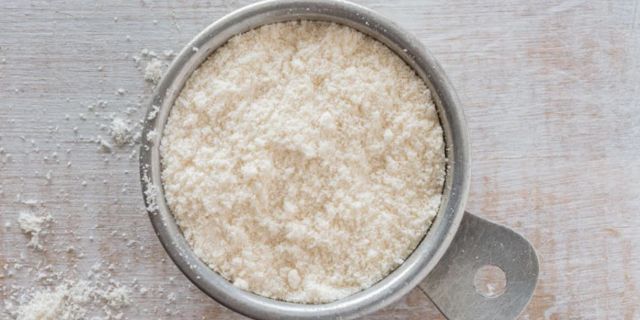Top 5 Health Benefits of Coconut Flour
Is coconut flour healthy, how does it affect blood sugar and is it gluten free? A nutritionist describes the nutritional profile of this popular ingredient.
What is coconut flour?
Coconut flour is a soft flour made from dried coconut meat. When coconut milk is extracted from the flesh of the coconut, it is then dried at a low temperature and ground into a flour that is suitable for baking.

Nutritional Benefits of Coconut Flour
A 100 g portion of coconut flour provides*:
- 433Kcal / 1819KJ
- 19g protein
- 14.4g fat
- 13.3g Saturated fat
- 34.1g Carbohydrates
- 32.9g Sugar
- 22.6g Fiber
*Please note that the figures are given as an indication. Due to the paucity of approved nutritional data on coconut flour, numbers may vary between brands.
Top 5 Health Benefits of Coconut Flour
1. Gluten-free
Pure coconut flour is a gluten-free product. However, always check the label, especially if you have celiac disease or a gluten allergy. Some brands may contain added ingredients that contain gluten, or be produced in a facility that handles products containing gluten. If there is a risk of cross-contamination, this must be clearly indicated on the label.
2. Is high in fiber
Coconut flour is considered a high fiber food, with up to 45g per 100g. Government guidelines recommend that adults consume 30g of fiber per day. A heaped tablespoon (about 10 g) of coconut flour alone therefore provides just over 10% of the recommended daily intake.
With most UK adults only consuming an average of around 18g a day, it’s important to increase your fiber intake as it’s been shown to be associated with a number of health benefits, including risk lower colon cancer.
3. May Support Blood Sugar Control
Coconut flour appears to have a low glycemic index of 51, which means it should cause fewer spikes in blood sugar than wheat flour, which has a glycemic index of 69. Indeed, coconut flour is rich fat and fiber, which slow the release of sugar into the blood.
4. May Support Heart Health
Incorporating coconut flour into the diet increases fiber content, which can help with cholesterol management.
However, the type of fat in coconut flour is called medium chain triglyceride. Studies vary on whether medium-chain triglycerides have a desirable or undesirable overall effect on cholesterol and heart health. More research needs to be conducted in this area, and the advice remains that coconut products should be consumed sparingly to keep overall fat intake within the Daily Reference Intake (RDA) limits of 70 g of total fat and 20 g of saturated fat.
5. A source of protein
Coconut flour is a source of protein, with an intake of 18 g per 100 g, against only 12 g for an equivalent amount of wholemeal flour.
However, the protein in coconut flour is incomplete protein, which means it contains only five of the essential amino acids that we need in our daily diet. The term “essential” means that we must obtain these amino acids from the diet, because the body cannot manufacture them itself. Protein is essential in the diet as it plays a vital role in the growth and repair of the body, as well as functions such as immunity.
Is coconut flour safe for everyone?
Generally safe for most people, coconut flour makes a useful alternative to wheat flour. High in fiber, it can cause bloating in some people, especially if they are not used to incorporating fibrous foods into their diet.
Nicola Shubrook is a nutritional therapist and works with private and corporate clients. She is an accredited member of the British Association for AppliedNutrition and Nutritional Therapy (BANT) and the Complementary & NaturalHealthcare Council (CNHC). To find out more, visit urbanwellness.co.uk.
Kerry Torrens is a qualified nutritionist (MBANT) and has a postgraduate degree in personalized nutrition and nutrition therapy. She is a member of the British Association for Nutrition and Lifestyle Medicine (BANT) and the Guild of Food Writers. Over the past 15 years she has contributed to a number of nutrition and cooking publications including BBCGood Food.




